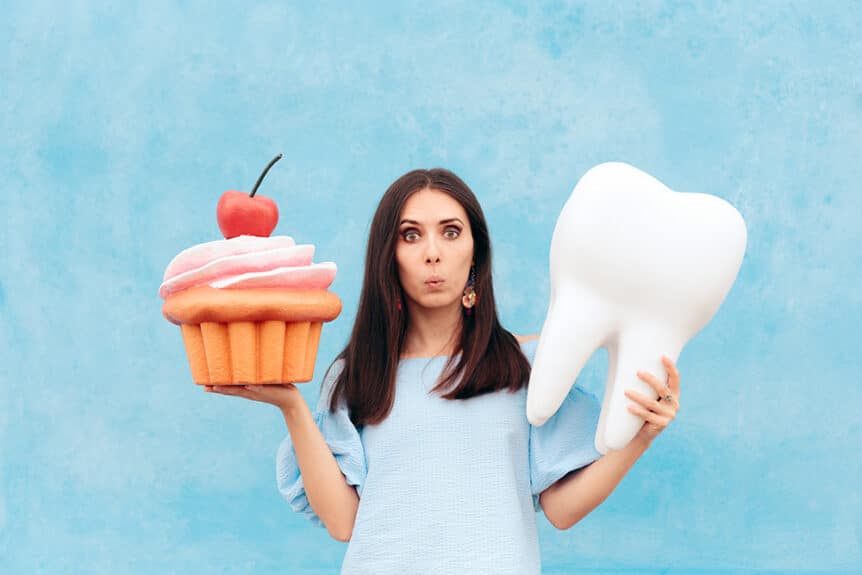Do you have a sweet tooth?
For those who love sweets, they may be surprised to know that sugars are not the main cause of tooth decay (cavities).
Everyday, there is a battle in your mouth between good and bad bacteria. It is actually decay causing bacteria that produces the acids that destroy tooth enamel and cause tooth decay. While sugar can cause bacteria to cause acid, other factors also contribute to tooth decay that may surprise you.
So, let’s separate fact from fiction when it comes to sugar and your teeth!
Fact: Sugar can cause tooth decay.
When sugars from food mix with plaque bacteria, acids form and breakdown enamel. Acid attacks eventually cause tooth decay over time.
Fiction: Only candy causes tooth decay
Acids in foods and low pH beverages can be just as or even more harmful than candy. Starch-filled food like pasta and bread can trigger an acid attack. Even drinks like juice, milk, and sports drinks can stimulate acid production.
Fact: Brushing after sugary snacks can prevent tooth decay, but not always IMMEDIATELY afterward.
Consuming sugary snacks can trigger an acid attack, which weakens enamel. According to the Oral Health Foundation, brushing immediately after eating acidic foods can cause tiny particles of enamel to be removed. Rather, it is best to brush your teeth before you will be consuming sugary foods so that less plaque bacteria are on your teeth, thus less acids are produced.
The most recent recommendation suggest rinsing with water immediately after eating sugary foods and brushing between 30-60 minutes after eating.
Fiction: All sugar is bad for your teeth.
Xylitol is a type of sugar that is naturally found in certain foods such as raspberries and cauliflower. Rather than cause decay, xylitol can actually prevent decay. Fortunately, xylitol is now present in chewing gum, mints, and even mouth sprays.
Fact: Chocolate is the best candy for your teeth.
According to the American Dental Association (ADA), chocolate is probably the candy that is least likely to cause tooth decay because it washes off of your teeth more easily than other types of candy. Sticky candy can be difficult to remove with rinsing and brushing. Hard candies take longer to dissolve in the mouth, which leads to a longer acid attack. And sour candies are more acidic that most other candies.
Fiction: Small doses of candy snacks are less harmful:
The acid attack does not increase with the amount of candy. Because of that, one small piece of candy can cause the same type of acid as a handful. The key is to limit how many times sugar is consumed in a day instead of how much.
Fact: Sipping on soda and sports drinks all decay cause high levels of decay.
The ADA says, “Drink, Don’t Sip” in their campaign to educate the public about the dangers of sugary drinks. Sipping sweetened drinks all day gives plaque bacteria all day to eat the sugars, which essentially creates an all-day acid attack!
Fiction: Diet drinks are safe for your teeth.
Diet beverages often contain additives such as phosphoric acid that causes a lower pH level, which contributes to tooth decay. A University of Michigan study concluded that many diet sodas had a lower pH than some sweetened beverages.
Do you need to completely cut out sugar from your diet for your oral health?
The simple answer is, No. While reducing intake of refined sugars and starchy foods is helpful to reduce acid triggers within the mouth, natural sugars found in fruits and vegetables have health benefits and should not be avoided.
And indulging in a sweet snack occasionally is fine if you follow a few key steps:
- Limit sticky sweets
- Avoid sipping sweetened beverages all day
- Rinse with water immediately after eating or drinking something sugary
- Brush twice a day
- Visit your dentist at least twice a year


